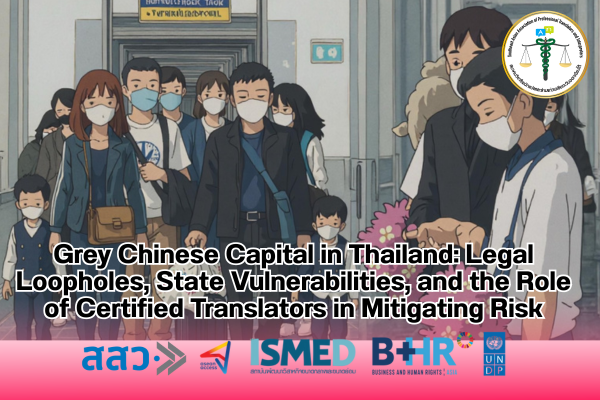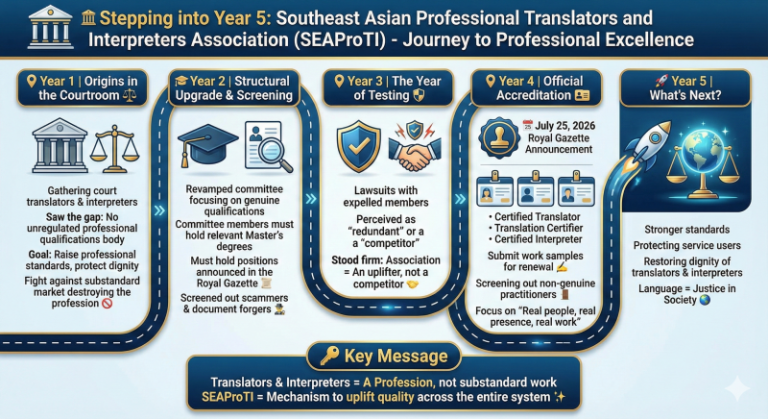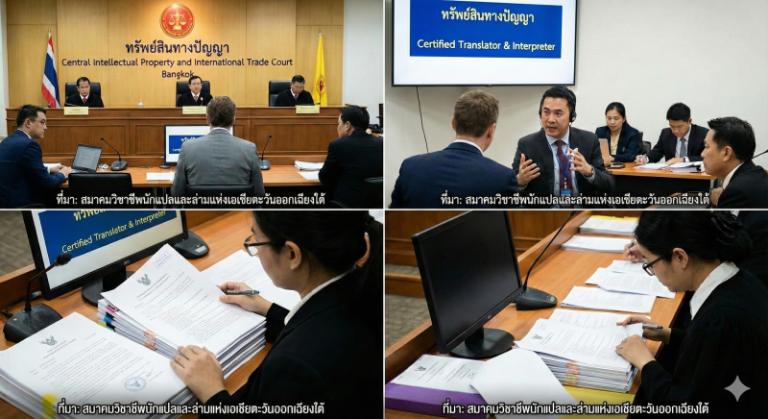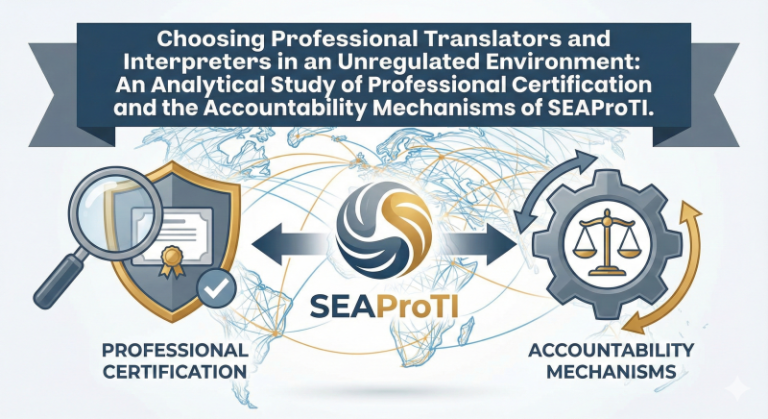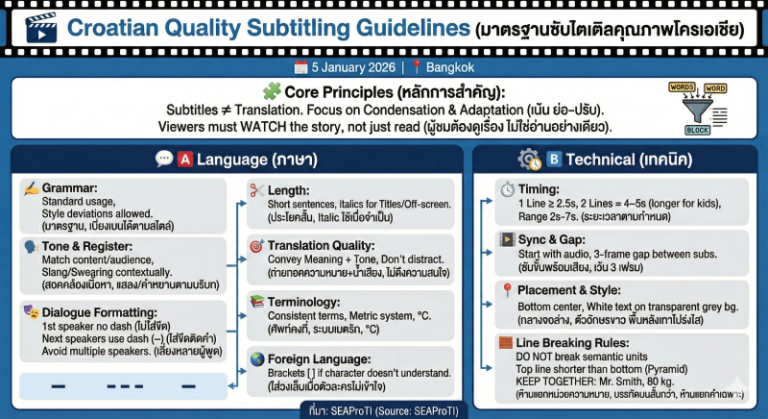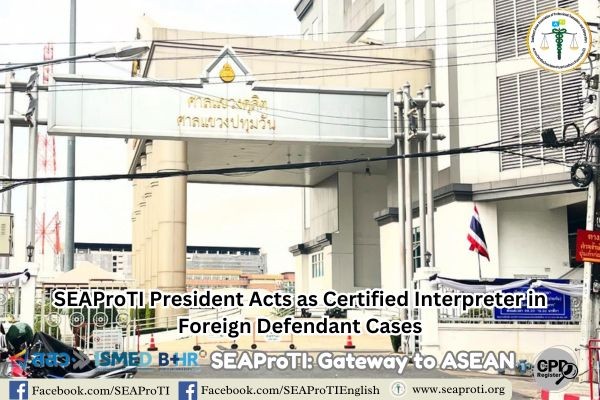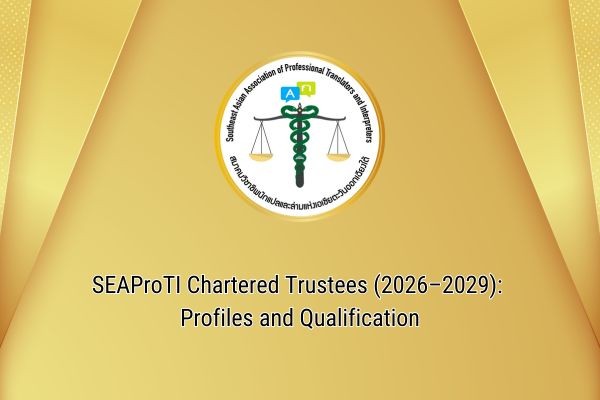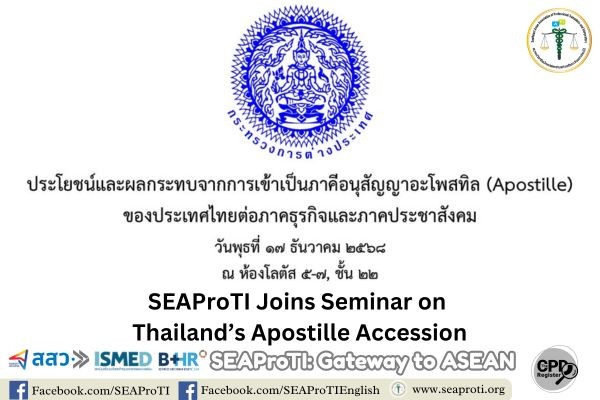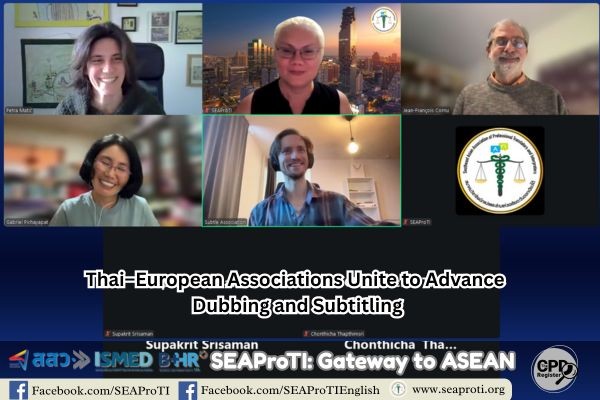Grey Chinese Capital in Thailand: Legal Loopholes, State Vulnerabilities, and the Role of Certified Translators in Mitigating Risk
Abstract
This article investigates the phenomenon of “Grey Chinese” in the context of Thailand—referring to Chinese nationals and capital operating within ambiguous legal boundaries. These actors often exploit loopholes in Thai regulations, use Thai nationals as nominee shareholders, and submit legally non-compliant translated documents to register businesses that engage in illicit activities such as money laundering, online gambling, and human trafficking. A critical aspect of this infiltration involves the misuse of document translation and certification processes. This article proposes that adopting certified translators and certified translation practices through the Southeast Asian Association of Professional Translators and Interpreters (SEAProTI) could strengthen document verification systems and reduce opportunities for grey capital to exploit the Thai legal framework.
1. Introduction
Over the past decade, Thailand has experienced a growing influx of capital from mainland China, particularly from groups known as “Grey Chinese”—a term used to describe individuals and entities operating in legally ambiguous areas. These groups deploy a variety of tactics to establish operations in Thailand, including exploiting state loopholes, registering companies under nominee Thai shareholders, marrying Thai citizens to acquire property rights, and submitting improperly translated documents for official use. These actions reflect systemic weaknesses in the Thai bureaucratic system and hinder effective enforcement of the law.
2. Entry Channels of Grey Chinese Capital
2.1 Visa-Free Travel and Minimal Screening
In March 2024, the Thai government introduced a permanent visa exemption for Chinese tourists as part of its post-pandemic economic recovery plan. However, this policy has also inadvertently created an easy entry point for individuals engaged in grey activities who wish to establish residency or conduct operations under the guise of tourism (Department of Tourism, 2024).
2.2 Nominee Business Registrations
Grey Chinese investors often register companies using Thai nominees to circumvent restrictions on foreign ownership. According to the Department of Business Development, over 300 companies were registered in a single year using Thai nationals as majority shareholders, even though Chinese individuals exercised full operational control (Prachachat Business, 2024).
3. Illegal Translation Practices and Administrative Vulnerabilities
A key method through which grey investors manipulate the system involves the submission of translated documents that fail to meet legal certification requirements. This includes:
- Lawyers translating and certifying documents themselves, which is illegal under Thai administrative law.
- Newly graduated language students being misled into signing translation certifications without proper qualifications.
- Local administrative offices accepting uncertified or improperly certified translations in violation of the 1997 Ministerial Regulation under the Thai Administrative Procedure Act of 1996 (SEAProTI, 2025).
- These practices weaken the integrity of document verification in public administration and facilitate the infiltration of grey capital through ostensibly legal channels.
4. Case Study: Tu Hao and Systemic Grey Capital Infiltration
The arrest of Chaiyuth Chirawatworakul, known as “Tu Hao,” in 2022 serves as a prominent case study. His business empire was built through a network of nominee-registered companies, illegally certified documents, and deep connections with Thai officials. This case exemplifies how grey capital can entrench itself through manipulation of bureaucratic processes (The Bangkok Post, 2022).
5. A Way Forward: Certified Translators and SEAProTI’s Role
5.1 About SEAProTI
The Southeast Asian Association of Professional Translators and Interpreters (SEAProTI) is a regional organization that certifies translators and translation reviewers based on international standards. SEAProTI’s certification process includes professional training, rigorous testing, ethical guidelines, and a centralized identification system for each certified professional.
5.2 Enhancing Governmental Due Diligence
If Thai government agencies were to accept only certified translations from SEAProTI-accredited translators, it would:
- Ensure legal compliance and accuracy in official documents.
- Prevent name fraud or unauthorized certification.
- Establish a verifiable record of accountability for each translation.
- Increase Thailand’s legal and administrative transparency, particularly in international commerce.
- Limit the use of fake or fraudulently certified documents by grey capital entities.
To mitigate future abuse, the following measures are proposed:
- Enact ministerial regulations requiring official translations to be performed and certified by recognized professional bodies.
- Develop a centralized, accessible verification system for translation certifications.
- Provide training to government officials to detect illegal translation practices and understand legal translation standards.
6. Conclusion
The problem of “Grey Chinese” capital infiltrating Thailand is not solely a matter of immigration or finance—it is deeply connected to vulnerabilities within the bureaucratic system. Specifically, the misuse of document translation and certification has emerged as a key enabler of grey operations. Leveraging a professional certification system such as SEAProTI’s can serve as a robust barrier against such exploitation by enforcing standards, increasing traceability, and supporting legal integrity in business registration and foreign investment. The Thai state must proactively adopt professional translation frameworks to protect the rule of law and the country’s long-term economic security.
References
- Department of Tourism. (2024). Impact assessment of the permanent visa-free policy for Chinese tourists. Bangkok: Ministry of Tourism and Sports.
- Prachachat Business. (2024, April 10). Grey Chinese capital dominates Thai company registrations: Over 300 firms under nominee control. Retrieved from https://www.prachachat.net
- Southeast Asian Association of Professional Translators and Interpreters. (2025). Audit report on translation certification in Thai administrative processes. Bangkok: SEAProTI.
- The Bangkok Post. (2022, November 30). Tu Hao’s arrest exposes grey Chinese capital’s grip on Thai society. Retrieved from https://www.bangkokpost.com
The Southeast Asian Association of Professional Translators and Interpreters (SEAProTI) has officially announced the criteria and qualifications for individuals to register as “Certified Translators,” “Translation Certification Providers,” and “Certified Interpreters” under the association’s regulations. These guidelines are detailed in Sections 9 and 10 of the Royal Thai Government Gazette, issued by the Secretariat of the Cabinet under the Office of the Prime Minister of the Kingdom of Thailand, dated July 25, 2024, Volume 141, Part 66 Ng, Page 100. the Royal Thai Government Gazette
“จีนเทา” กับทุนสีเทาในประเทศไทย: ช่องโหว่ของระบบราชการและบทบาทของนักแปลรับรองในการสร้างภูมิคุ้มกันทางกฎหมาย
บทคัดย่อ
บทความนี้ศึกษาปรากฏการณ์ “จีนเทา” (Grey Chinese) ในบริบทของประเทศไทย ซึ่งหมายถึงกลุ่มทุนจากจีนที่เข้ามาดำเนินธุรกิจโดยใช้ช่องโหว่ของกฎหมายและระบบราชการไทย เพื่อประกอบกิจการที่อยู่ในลักษณะกึ่งถูกกฎหมาย เช่น การฟอกเงิน การพนันออนไลน์ การค้ามนุษย์ และธุรกิจบังหน้าโดยมี “นอมินี” คนไทยถือหุ้นแทน นอกจากนี้ ยังพบว่าหน่วยงานราชการยอมรับเอกสารแปลที่แปลและรับรองโดยผู้ไม่มีคุณสมบัติตามกฎหมาย ทำให้ทุนสีเทาสามารถจัดตั้งธุรกิจและหลีกเลี่ยงการตรวจสอบได้ง่ายขึ้น บทความเสนอให้ใช้ระบบนักแปลรับรองและผู้รับรองการแปลของสมาคมวิชาชีพนักแปลและล่ามแห่งเอเชียตะวันออกเฉียงใต้ (SEAProTI) เพื่อเสริมสร้างมาตรฐานทางกฎหมาย และลดช่องโหว่ในการจดทะเบียนพาณิชย์
1. บทนำ
ในช่วงทศวรรษที่ผ่านมา ประเทศไทยเผชิญกับการขยายตัวของทุนจากจีนแผ่นดินใหญ่ โดยเฉพาะกลุ่มที่เรียกว่า “จีนเทา” (Grey Chinese) ซึ่งดำเนินกิจการในลักษณะ “ทุนสีเทา” กล่าวคือ มีลักษณะไม่ชัดเจนระหว่างความถูกต้องตามกฎหมายกับความผิดกฎหมาย กลุ่มทุนเหล่านี้ใช้ช่องโหว่ของระบบราชการไทย โดยเฉพาะการจดทะเบียนนิติบุคคลผ่านนอมินีคนไทย การสมรสเพื่อประโยชน์ทางกฎหมาย และการยื่นเอกสารแปลที่ไม่ได้รับการรับรองอย่างถูกต้อง ส่งผลให้การบังคับใช้กฎหมายของรัฐไทยไร้ประสิทธิภาพและเปิดช่องให้ทุนผิดกฎหมายขยายตัว
2. ลักษณะของ “จีนเทา” และช่องทางการเข้าสู่ประเทศไทย
รัฐบาลไทยประกาศนโยบาย ยกเว้นวีซ่าถาวร สำหรับนักท่องเที่ยวจีนตั้งแต่เดือนมีนาคม พ.ศ. 2567 เพื่อกระตุ้นเศรษฐกิจการท่องเที่ยว แต่กลับกลายเป็นช่องทางที่บุคคลบางกลุ่มใช้เดินทางเข้าประเทศเพื่อประกอบธุรกิจผิดกฎหมายหรือแฝงตัวในระบบเศรษฐกิจของไทยโดยไม่ถูกตรวจสอบ (กรมการท่องเที่ยว, 2567)
กลุ่ม “จีนเทา” เหล่านี้มักใช้วิธีจดทะเบียนบริษัทโดยอาศัย “นอมินี” คนไทยเป็นผู้ถือหุ้นแทน เพื่อหลีกเลี่ยงกฎหมายจำกัดการถือครองของชาวต่างชาติ ตามข้อมูลของกรมพัฒนาธุรกิจการค้า มีบริษัทที่มีโครงสร้างถือหุ้นน่าสงสัยกว่า 300 รายจดทะเบียนในช่วงปีที่ผ่านมา โดยกลุ่มทุนจีนเป็นผู้ควบคุมที่แท้จริง (ประชาชาติธุรกิจ, 2567)
3. การแปลเอกสารโดยมิชอบกับการแทรกซึมของทุนสีเทา
การยื่นเอกสารแปลที่ผิดกฎหมายถือเป็นอีกหนึ่งช่องทางที่ทุนจีนเทาใช้ในการดำเนินธุรกิจ โดยพบว่า:
- มีการใช้ ทนายความแปลและรับรองการแปลเอง ซึ่งผิดกฎกระทรวง พ.ศ. 2540 ที่ออกตาม พ.ร.บ. วิธีปฏิบัติราชการทางปกครอง พ.ศ. 2539
- การว่าจ้าง นักศึกษาจบใหม่ในสาขาภาษา ให้ลงชื่อรับรองการแปล โดยไม่มีคุณสมบัติตามกฎหมาย
- เจ้าหน้าที่ใน สำนักงานพาณิชย์จังหวัด/เขต หลายแห่งยอมรับเอกสารที่แปลโดยผู้ไม่มีสิทธิรับรองการแปลตามกฎหมาย (สมาคมวิชาชีพนักแปลและล่ามแห่งเอเชียตะวันออกเฉียงใต้, 2568)
- การกระทำเหล่านี้ไม่เพียงทำให้ระบบการรับรองเอกสารไร้ประสิทธิภาพ แต่ยังเปิดช่องให้กลุ่มทุนเทาใช้ราชการไทยในการสร้างความชอบธรรมให้กับการประกอบธุรกิจผิดกฎหมาย
4. กรณีศึกษา: “ตู้ห่าว” และทุนจีนเทาในประเทศไทย
กรณีของนายชาญยุทธ ฉายะบุตร หรือ “ตู้ห่าว” ซึ่งถูกจับกุมในปี 2565 เป็นกรณีศึกษาที่สะท้อนถึงการใช้ระบบจดทะเบียนธุรกิจและเอกสารแปลอย่างผิดกฎหมายในการฟอกเงินและขยายอิทธิพลทางธุรกิจในประเทศไทย โดยเครือข่ายของเขาครอบคลุมทั้งธุรกิจอสังหาริมทรัพย์ สถานบันเทิง และการลักลอบนำเข้าสินค้าผิดกฎหมาย (The Bangkok Post, 2022)
5. ทางออก: ระบบนักแปลรับรองและผู้รับรองการแปลของ SEAProTI
5.1 SEAProTI และมาตรฐานการรับรอง
สมาคมวิชาชีพนักแปลและล่ามแห่งเอเชียตะวันออกเฉียงใต้ (SEAProTI) มีระบบรับรองนักแปลและผู้รับรองการแปลที่ผ่านการอบรม ทดสอบ และควบคุมคุณภาพตามมาตรฐานสากล ผู้ที่ได้รับการขึ้นทะเบียนจะมีรหัสประจำตัวที่ตรวจสอบย้อนหลังได้ และต้องปฏิบัติตามจรรยาบรรณวิชาชีพอย่างเคร่งครัด
5.2 ประโยชน์ต่อระบบราชการไทย
หากหน่วยงานราชการไทยเลือกใช้เฉพาะเอกสารที่แปลและรับรองโดยผู้มีคุณสมบัติจาก SEAProTI จะช่วย:
- ยกระดับความถูกต้องของเอกสารประกอบการจดทะเบียนธุรกิจ
- ป้องกันการปลอมแปลง/สวมชื่อในการรับรองเอกสาร
- ปิดช่องทางของทุนเทาในการใช้เอกสารปลอมเข้าสู่ระบบธุรกิจไทย
- สร้างความน่าเชื่อถือต่อระบบกฎหมายของไทยในระดับสากล
5.3 ข้อเสนอเชิงนโยบาย
- ออกประกาศกระทรวงหรือระเบียบราชการที่กำหนดให้ต้องใช้ผู้รับรองการแปลที่ขึ้นทะเบียนกับสมาคมวิชาชีพที่ได้รับการยอมรับ
- พัฒนาระบบฐานข้อมูลกลางสำหรับตรวจสอบเอกสารแปลและผู้รับรอง
- ให้มีการฝึกอบรมเจ้าหน้าที่รัฐเกี่ยวกับข้อกฎหมายการรับรองการแปลและการตรวจสอบคุณสมบัติผู้แปล
6. สรุป
“จีนเทา” เป็นภัยเงียบที่ขยายอิทธิพลผ่านช่องโหว่ทางกฎหมายและการขาดมาตรฐานในระบบราชการไทย โดยเฉพาะในกระบวนการรับรองเอกสารและการจดทะเบียนพาณิชย์ การยกระดับระบบการแปลเอกสารผ่านนักแปลรับรองและผู้รับรองการแปลของ SEAProTI ถือเป็นแนวทางที่เป็นรูปธรรมในการป้องกันทุนสีเทาไม่ให้แทรกซึมเข้าสู่ระบบเศรษฐกิจไทยได้อีกต่อไป
บรรณานุกรม
- กรมการท่องเที่ยว. (2567). รายงานผลกระทบของนโยบายยกเว้นวีซ่าสำหรับนักท่องเที่ยวจีน. กรุงเทพมหานคร: กระทรวงการท่องเที่ยวและกีฬา.
- ประชาชาติธุรกิจ. (2567, เมษายน 10). ทุนจีนเทาฮุบไทย: พบตั้งบริษัท 300 แห่งใช้ชื่อคนไทยบังหน้า. สืบค้นจาก https://www.prachachat.net
- สมาคมวิชาชีพนักแปลและล่ามแห่งเอเชียตะวันออกเฉียงใต้. (2568). รายงานสรุปการตรวจสอบการรับรองการแปลเอกสารในราชการ. กรุงเทพมหานคร: SEAProTI.
- The Bangkok Post. (2022, November 30). Tu Hao’s case raises red flags on Chinese grey capital in Thailand. Retrieved from https://www.bangkokpost.com
เกี่ยวกับนักแปลรับรอง ผู้รับรองการแปล และล่ามรับรองของสมาคมวิชาชีพนักแปลและล่ามแห่งเอเชียตะวันออกเฉียงใต้
สมาคมวิชาชีพนักแปลและล่ามแห่งเอเชียตะวันออกเฉียงใต้ (SEAProTI) ได้ประกาศหลักเกณฑ์และคุณสมบัติผู้ที่ขึ้นทะเบียนเป็น “นักแปลรับรอง (Certified Translators) และผู้รับรองการแปล (Translation Certification Providers) และล่ามรับรอง (Certified Interpreters)” ของสมาคม หมวดที่ 9 และหมวดที่ 10 ในราชกิจจานุเบกษา ของสำนักเลขาธิการคณะรัฐมนตรี ในสำนักนายกรัฐมนตรี แห่งราชอาณาจักรไทย ลงวันที่ 25 ก.ค. 2567 เล่มที่ 141 ตอนที่ 66 ง หน้า 100 อ่านฉบับเต็มได้ที่: นักแปลรับรอง ผู้รับรองการแปล และล่ามรับรอง


